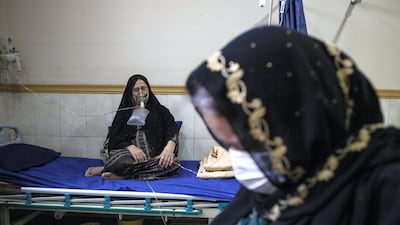Covid-19 will throw the future of some Middle East states into doubt, a group of medical researchers and specialists warned at an online discussion hosted by the London School of Economics.
Looking at how regional politics continue to have a cumulative effect on health, the panellists discussed how the pandemic exacerbated existing problems in Palestine, Lebanon and Iraq.
Calling the recent explosion of a hospital in Baghdad a "diagnostic event", Omar Dewachi, associate professor of medical anthropology at Rutgers University in the US, said it was emblematic of Iraq's failing health system and, by extension, the state.
“We are dealing with two very interconnected problems. The burden of disease that we're seeing in Iraq, or in Palestine, or in Lebanon, is very much linked to the failures of the political elites, but also to the collapse of these kind of infrastructures,” Mr Dewachi said.
At least 82 people were killed and 110 injured when an oxygen tank exploded at a hospital treating Covid-19 patients on the outskirts of Baghdad. There were no safety systems, fire extinguishers or sprinklers in the three-storey building, which had a false ceiling made of flammable material.
Iraq’s health system has been toiling for decades, exacerbated by 23 years of financial and trade sanctions that effectively deprived the country of vital medicine, and then the US-led invasion in 2003.
Despite many promises to rebuild the health system after the 2003–2011 US war in Iraq, Mr Dewachi, who wrote the book Ungovernable Life: Mandatory Medicine and Statecraft in Iraq, said the last public hospital to be built in the country was in 1986.
Covid-19, he said, was making an already fragile health system worse and creating a burgeoning black market for oxygen. Mr Dewachi said an increasing number of patients are developing antimicrobial resistance infections and making hospitals increasingly toxic places.
Also speaking at the online panel was Dr Weeam S Hammoudeh, assistant professor at the Institute of Community and Public Health at Birzeit University in the West Bank. She said the continued fragmentation of Palestine, coupled with the Israeli occupation and an inadequate Palestinian political system, led to a deteriorating health service that was unequipped to deal with Covid-19.

Israel restricts the entry of medicine to the West Bank and has put the Gaza Strip under a military blockade for the past 14 years, effectively draining the territory of medical supplies.
Residents need permits to exit the territory for medical treatment, which the Israeli authorities do not always grant. Despite receiving the lowest number of these applications in a decade, Israel rejected more than a third in the first half of 2020.
Dr Hammoudeh said little has been done to build a sustainable Palestinian health system.
“This was one of the things that actually has come out quite markedly in terms of the Covid-19 response, where a lot of these systemic failures have really weakened the response issues around fragmentation or the lack of sovereignty ... how we are working across parallel bodies that don't necessarily co-ordinate well with one another has really stifled the response and also just the ongoing occupation.”
Although Israel was lauded internationally for its high rate of Covid vaccine take-ups among Israelis, it was criticised for failing to provide vaccinations in the occupied Palestinian territories, despite jurists arguing that, as the occupying power, it had a duty to do so under international law.
British Palestinian plastic and reconstructive surgeon Ghassan Abu Sittah suggested Covid-19 was hastening the fragmentation and disintegration of some Arab states.
“We see the state, in front of our eyes, failing in all of its aspects, whether it's the theft of vaccines by the Lebanese political elite, or the theft of the vaccines by the Palestine political elite, whether it's the Jordanian hospital that ran out of oxygen during the second wave or the Egyptian hospital that had the same experience,” he said.
Concluding the 90-minute session, Mr Dewachi offered an ominous forecast.
“I think the future looks very grim for the region in terms of where things are going. And I think they still haven't hit rock bottom, I think we're just now beginning to see these kind of major crises emerging under Covid.”


